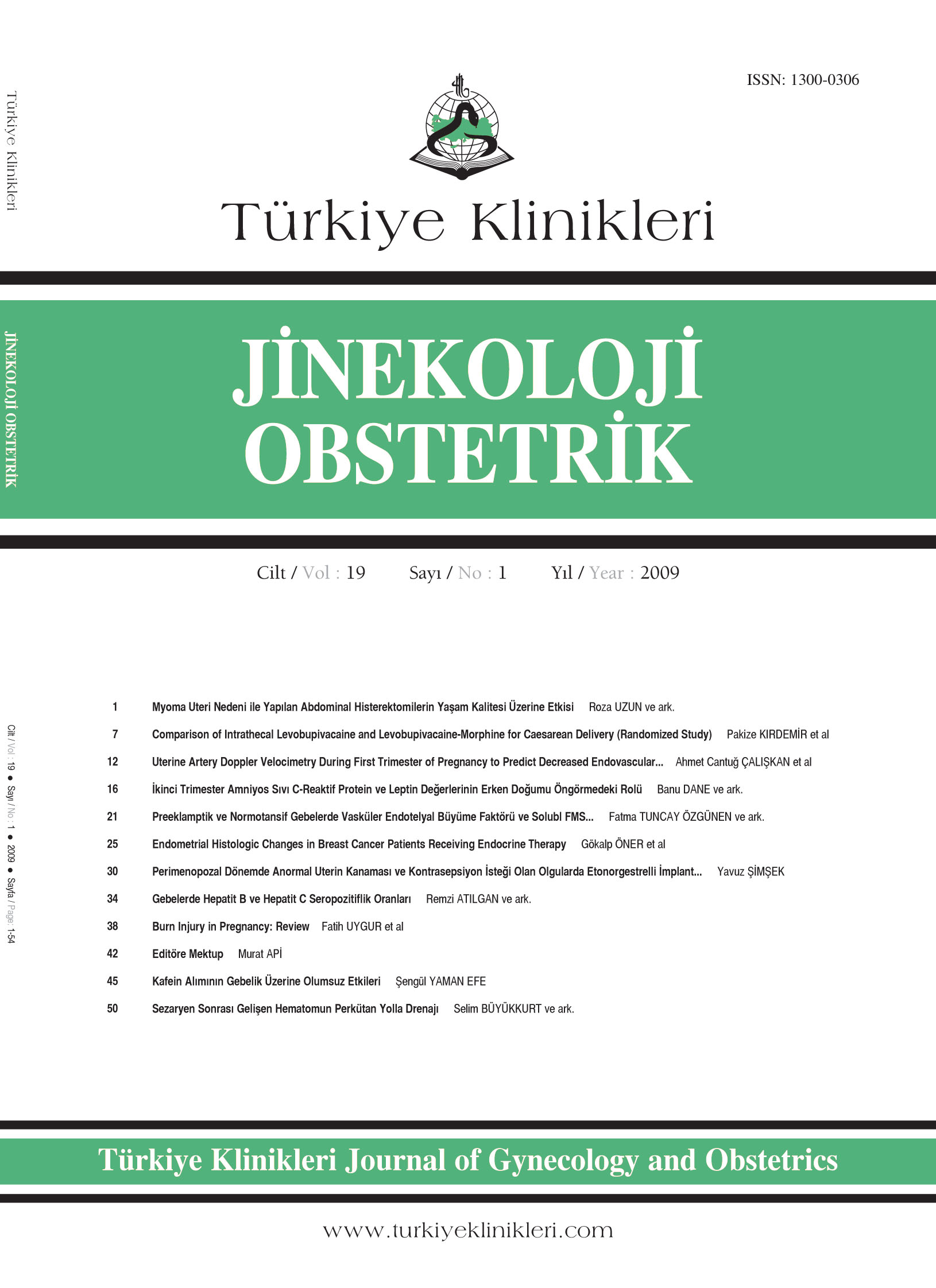Open Access
Peer Reviewed
ORIGINAL RESEARCH
3225 Viewed1088 Downloaded
The Role of Amniotic Fluid C-Reaktive Protein and Leptin at Second Trimester in the Prediction of Preterm Delivery
İkinci Trimester Amniyos Sıvı C-Reaktif Protein ve Leptin Değerlerinin Erken Doğumu Öngörmedeki Rolü
Turkiye Klinikleri J Gynecol Obst. 2009;19(1):16-20
Article Language: TR
Copyright Ⓒ 2025 by Türkiye Klinikleri. This is an open access article under the CC BY-NC-ND license (http://creativecommons.org/licenses/by-nc-nd/4.0/)
ÖZET
Amaç: Gebeliğin ilk yarısında bulunan intrauterin enfeksiyonun erken doğuma yol açabilecek bir durum olduğu öne sürülmektedir. Leptin, sitotrofoblastik hücrelerin invazyon özelliğini belirlemektedir. İnvazyon eksikliği durumunda amnios sıvısına salgılanan leptin seviyesi artmaktadır. Bu çalışmanın amacı, amniyos sıvı C-Reaktif Protein (CRP) ve leptin değerlerinin erken doğumu öngörmede etkinliğini belirlemektir. Gereç ve Yöntemler: Bu prospektif çalışmaya 71 gebe dahil edildi. Amniyos sıvı CRP ve leptin değerleri genetik amniyosentez sırasında belirlendi. Verilerin karşılaştırılması Student t-testi ve receiver-operating characteristic (ROC) eğrisi analizi yolu ile yapıldı. Bulgular: Tamamlanmış 37. Gebelik haftasından önce spontan doğum sıklığı %8.4 (6 olgu) idi. Erken ve miadında doğum yapan gruplar arasında ortalama CRP değeri açısından anlamlı fark izlenmedi (0.45 ve 0.4 mg/L, p= 0.59). Ortalama leptin değerleri de gruplar arasında fark göstermemekteydi (18 ve 12 ng/mL, p= 0.28). Yapılan ROC eğrisi değerlendirmesinde amniyos sıvı CRP ve leptin değerlerinin erken doğumu öngörmede etkin olmadığı belirlendi (her iki grupta AUC= 0.57). Sonuç: Genetik amniyosentez yapılan hastalarda erken doğumu öngörebilmek amaçlı amniyos sıvı CRP ve/veya Leptin değerlerinin belirlenmesinin gebelik takibinde fayda sağlamaya-cağını düşünmekteyiz.
Amaç: Gebeliğin ilk yarısında bulunan intrauterin enfeksiyonun erken doğuma yol açabilecek bir durum olduğu öne sürülmektedir. Leptin, sitotrofoblastik hücrelerin invazyon özelliğini belirlemektedir. İnvazyon eksikliği durumunda amnios sıvısına salgılanan leptin seviyesi artmaktadır. Bu çalışmanın amacı, amniyos sıvı C-Reaktif Protein (CRP) ve leptin değerlerinin erken doğumu öngörmede etkinliğini belirlemektir. Gereç ve Yöntemler: Bu prospektif çalışmaya 71 gebe dahil edildi. Amniyos sıvı CRP ve leptin değerleri genetik amniyosentez sırasında belirlendi. Verilerin karşılaştırılması Student t-testi ve receiver-operating characteristic (ROC) eğrisi analizi yolu ile yapıldı. Bulgular: Tamamlanmış 37. Gebelik haftasından önce spontan doğum sıklığı %8.4 (6 olgu) idi. Erken ve miadında doğum yapan gruplar arasında ortalama CRP değeri açısından anlamlı fark izlenmedi (0.45 ve 0.4 mg/L, p= 0.59). Ortalama leptin değerleri de gruplar arasında fark göstermemekteydi (18 ve 12 ng/mL, p= 0.28). Yapılan ROC eğrisi değerlendirmesinde amniyos sıvı CRP ve leptin değerlerinin erken doğumu öngörmede etkin olmadığı belirlendi (her iki grupta AUC= 0.57). Sonuç: Genetik amniyosentez yapılan hastalarda erken doğumu öngörebilmek amaçlı amniyos sıvı CRP ve/veya Leptin değerlerinin belirlenmesinin gebelik takibinde fayda sağlamaya-cağını düşünmekteyiz.
ANAHTAR KELİMELER: CRP, amniyosentez, erken doğum, leptin, amniyos
ABSTRACT
Objective: A preexisting intrauterine inflamation in the first half of gestation has been proposed as a possible condition that leads to preterm delivery. Leptin is a modulator of invasive property of cytotrophoblastic cells. Invasion defect increases leptin concentrations secreted into the amniotic fluid. The aim of this study was to investigate whether amniotic fluid CRP and leptin concentrations are markers of preterm delivery. Material and Methods: Seventy one singleton pregnancies were included in this prospective study. Amniotic fluid CRP and leptin concentrations were determined at the time of genetic amniocentesis. Comparison of the data was done with student t test and Receiver-operating characteristic (ROC) curve analysis. Results: The prevalence of spontaneous preterm delivery before 37 weeks of gestation was 8.4%. The mean CRP levels were not different in preterm and term group (0.45 vs. 0.4 mg/L, p= 0.59). The mean leptin levels were also not different in two groups (18 vs.12 ng/mL, p= 0.28). ROC analysis revealed that amniotic fluid CRP and leptin levels did not have any significant power in the prediction of preterm delivery (AUC <0.5 in both of the groups). Conclusions: The determination of CRP and or leptin concentrations of amniotic fluid at second trimester genetic amniocentesis in order to predict preterm delivery is not beneficial in the antenatal care.
Objective: A preexisting intrauterine inflamation in the first half of gestation has been proposed as a possible condition that leads to preterm delivery. Leptin is a modulator of invasive property of cytotrophoblastic cells. Invasion defect increases leptin concentrations secreted into the amniotic fluid. The aim of this study was to investigate whether amniotic fluid CRP and leptin concentrations are markers of preterm delivery. Material and Methods: Seventy one singleton pregnancies were included in this prospective study. Amniotic fluid CRP and leptin concentrations were determined at the time of genetic amniocentesis. Comparison of the data was done with student t test and Receiver-operating characteristic (ROC) curve analysis. Results: The prevalence of spontaneous preterm delivery before 37 weeks of gestation was 8.4%. The mean CRP levels were not different in preterm and term group (0.45 vs. 0.4 mg/L, p= 0.59). The mean leptin levels were also not different in two groups (18 vs.12 ng/mL, p= 0.28). ROC analysis revealed that amniotic fluid CRP and leptin levels did not have any significant power in the prediction of preterm delivery (AUC <0.5 in both of the groups). Conclusions: The determination of CRP and or leptin concentrations of amniotic fluid at second trimester genetic amniocentesis in order to predict preterm delivery is not beneficial in the antenatal care.
MENU
POPULAR ARTICLES
MOST DOWNLOADED ARTICLES





This journal is licensed under a Creative Commons Attribution-NonCommercial-NoDerivatives 4.0 International License.










